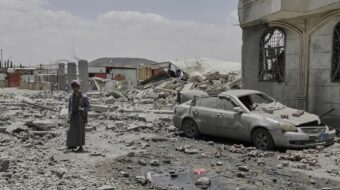News Analysis
Evidence is mounting that the Bush administration is preparing a major military attack on Islamic Republic of Iran.
In January investigative journalist Seymour Hersh reported that top military and intelligence officials told him, “the next strategic target [after Iraq] was Iran.” News reports say months ago former Israeli Prime Minister Ariel Sharon ordered the Israeli military to be ready for unleashing an air assault on Iran by this month. At least two unmanned U.S. drone aircraft have crashed while flying over Iran, identifying potential targets.
Couple these developments with almost daily pronouncements by Dick Cheney, Donald Rumsfeld, Condoleezza Rice or President Bush that Iran is a “pariah,” that it has a covert nuclear weapons program, that it has crossed a “red line,” that it is an ally of al-Qaeda, that it poses a menace to peace, and that “there is little more to talk about,” and the picture is clear: a pre-emptive U.S. strike against Iran is increasingly likely.
The pretext will be preventing Iran from developing nuclear weapons. Yet according to the International Atomic Energy Agency, there is not a shred of evidence that Iran possesses or is developing such weapons. And weapons experts say even if Iran wanted to produce nuclear weapons, it wouldn’t be able to do so for at least 10 years.
Iran is a signatory to the Nuclear Non-Proliferation Treaty. The treaty explicitly allows countries like Iran to develop nuclear power to generate electricity. All indications from IAEA inspections and records show that this has been the sum total of Iran’s research program.
The vote in the IAEA on Feb. 4 to “refer” Iran to the UN Security Council, a vote that was aggressively pushed by the Bush administration, is part of this picture. After this week’s meeting of the IAEA, and despite last-minute efforts by Russia and others to prevent Iran’s referral the Security Council, it looks like such a move is now imminent.
The referral will set in motion a process very similar to the run-up to the U.S. invasion of Iraq. The Bush administration’s goal is to lay the political basis for charging Iran with harboring weapons of mass destruction (WMDs). Its aim is to ultimately get the UN’s blessing, or acquiescence, to a U.S. pre-emptive attack. Sound familiar?
Iran has the second or third largest untapped oil reserves in the world, an estimated 126 billion barrels. It is also has about 16 percent of the world’s total. Aside from the Bush administration’s desire for unimpeded access to these resources, it also wants to ensure that its rivals, particularly Europe, Russia and China, are denied similar access.
According to multiple sources, Cheney has played a particularly active role in promoting the planned operation against Iran.
Philip Giraldi, an ex-CIA officer, wrote in the August 2005 American Conservative that Cheney had instructed the Pentagon to prepare for a massive air assault against some 450 targets in Iran, including nuclear power research sites and government command centers, to be launched in the event of another 9/11-type event, even if there were no link between the event and Iran. Such a plan could also be activated, of course, by another pretext, like the UN “failing to carry out its responsibilities” to curb Iran’s alleged nuclear WMD program.
This underscores another aspect of assault: namely, that unlike Iraq, the U.S. would not commit to a massive deployment of troops on Iranian soil, but instead would concentrate on crippling the country through bombing raids. Ominously, Pentagon documents have spoken quite explicitly about the likely use of massive “bunker buster” bombs, along with tactical nuclear weapons, to penetrate fortified Iranian facilities that are deep underground. Such a move would be catastrophic for the Iranian people and the region.
The U.S. corporate media is playing its part in the drumbeat to war, uncritically reporting Bush administration allegations of Iran’s wrongdoing. It has been helped in this regard by some of the more provocative statements by Iran’s right-wing President Mahmoud Ahmadinejad. Unfortunately, this seems to have had some effect on public opinion: one poll suggests 57 percent of the U.S. public would support an attack on Iran if it were done in the name of blocking its access to nuclear weapons.
As the third anniversary of the U.S. invasion of Iraq draws near, many antiwar activists will no doubt raise the demand of “No attack on Iran” in addition to “U.S. troops out of Iraq now.” Such a call seems timely.









